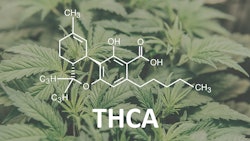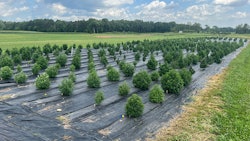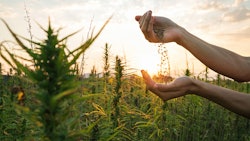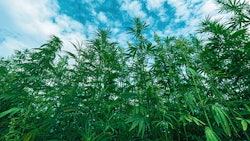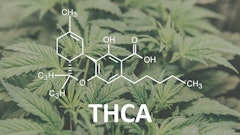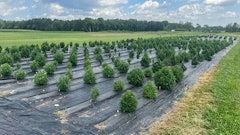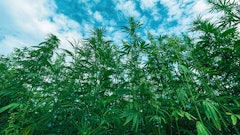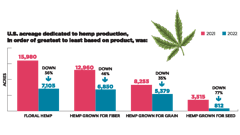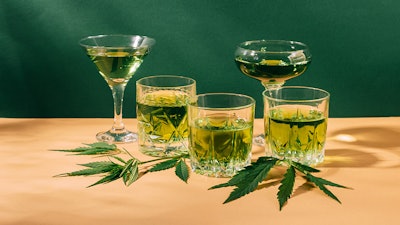
As beverages containing intoxicating hemp-derived cannabinoids continue to land on retail shelves throughout the country, a national advocacy group for the alcohol industry is urging Congress to address its concerns in the 2024 Farm Bill reauthorization.
Wine & Spirits Wholesalers of America (WSWA) wrote a letter to the chairs and ranking members of the U.S. House and Senate committees on Agriculture, recommending that they address a “public health crisis” associated with products containing intoxicating hemp-derived cannabinoids like delta-8 THC.
These products emerged as an unintended consequence of the 2018 Farm Bill, which federally legalized industrial hemp beyond state pilot programs, according to WSWA, a Washington, D.C.-based organization that champions federal and state policies that benefit its member distributors.
“Since the passage of the 2018 Farm Bill, intoxicating hemp products have evolved into an unregulated, multibillion-dollar industry,” WSWA wrote in the letter. “Producers have found ways to create synthetic derivatives, such as delta-8 THC and delta-10 THC, which have surged in popularity. Other hemp companies have developed methods to extract enough naturally occurring delta-9 THC into beverages and edibles to produce intoxicating effects.”
The U.S. hemp-derived cannabinoid market, including nonintoxicating CBD, is “conservatively” estimated to be $28.4 billion, according to Whitney Economics’ 2023 National Cannabinoid Report, making the market size the same as the 2022 craft beer market, Cannabis Business Times reported in April.
Included in this market is the nation’s largest independent fine wine retailer, Total Wine & More, which sells hemp-derived CBD- and THC-infused beverages.
RELATED: How Do US Hemp-Derived Cannabinoid Sales and Craft Beer Sales Compare?
Specifically, WSWA encouraged U.S. Sens. Debbie Stabenow, D-Mich., and John Boozman, R-Ark., and Reps. Glenn “GT” Thompson, R-Pa., and David Scott, D-Ga., to include two legislative provisions as the Farm Bill makes its way through the committee process:
- Grant agency authority to promulgate federal rules and regulations defining hemp compounds which would ban any synthetically derived compounds; and
- Empower states to regulate the sale, transport and import of naturally occurring intoxicating hemp compounds within their borders.
“Regulatory authority over alcoholic beverages is vested in the Secretary of the Treasury through the Federal Alcohol Administration Act,” WSWA wrote. “A similar framework could be applied to intoxicating hemp compounds and potentially incorporated into the 2024 Farm Bill.
“Just as the 21st Amendment empowered states to regulate the transport and import of alcoholic beverages, states should be granted similar authority over intoxicating hemp compounds. This regulatory structure would help ensure that these products are safely manufactured, marketed and sold. It would give states broad latitude to regulate or even ban these products in accordance with the wishes of their citizens.”
The WSWA letter comes nearly two weeks after the House Agriculture Committee completed a markup of its draft for the 2024 Farm Bill (the Farm, Food and National Security Act of 2024) on May 24, passing its proposed legislation out of committee in a 33-21 vote.
During the markup, committee members adopted an amendment to the legislation that would redefine hemp as containing no more than 0.3% total THC (delta-9 THC plus THCA) on a dry-weight basis. Sponsored by Rep. Mary Miller, R-Ill., the amendment also would change the definition only to include naturally occurring and derived cannabinoids that are nonintoxicating, federally banning any products with quantifiable amounts of THC (including THCA) as well as products with chemically synthetically cannabinoids such as delta-8, delta-10, THC-O and HHC.
Many hemp industry stakeholders opposed this amendment, saying it’d essentially kill all segments of the industry. Yet these stakeholders could potentially have another year of the status quo.
When or whether the full House will vote on the Farm Bill this year remains an unknown. Although the bill is set to expire Sept. 30, Congress is weighing its options to delay its reauthorization until 2025 amid disagreements over the Supplemental Nutrition Assistance Program (SNAP) and climate policies, the Washington Post reported June 4.
This possibility comes as the Farm Bill’s reauthorization—initially targeted for 2023—was already extended.
The 2024 Farm Bill, a $1.5-trillion proposal, extends to U.S. farmers in nearly every agricultural sector, shaping policies for what is grown and how it’s grown throughout the country. Whether it’s the appropriate place to deal with finished goods related to hemp cannabinoids continues to draw different viewpoints.
“The absence of federal oversight has resulted in significant public health risks,” WSWA wrote. “The safety, purity and potency of these products cannot be guaranteed, posing a serious threat to consumers. The processes used to create some of these products can leave harmful chemicals behind. Additionally, these potentially dangerous products are often sold over the counter without age restrictions, making them easily accessible to minors, with some even mimicking popular candy and snack packaging.”
According to the group, legal uncertainties remain without congressional action on clear federal guidelines.










